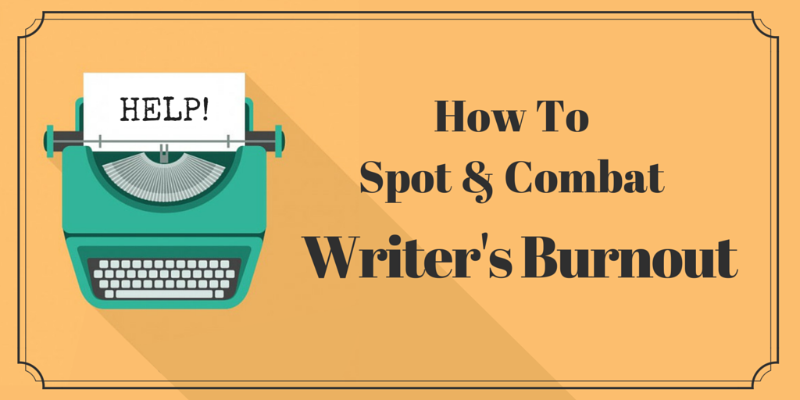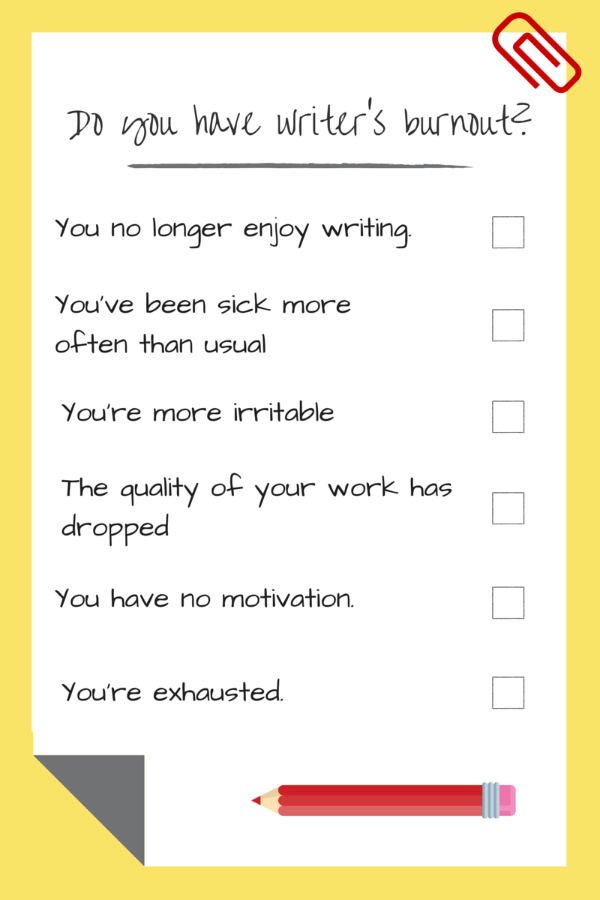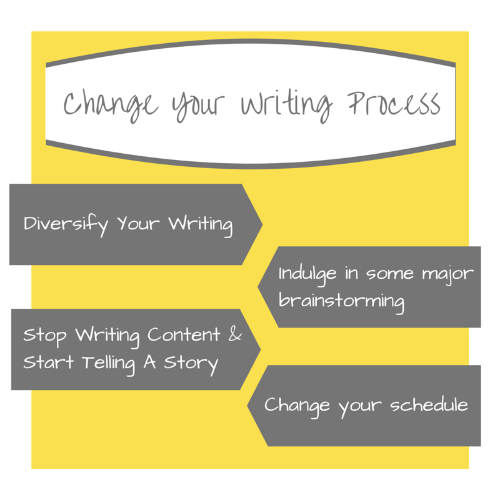Every day, without fail, you’re writing.
This could be because it’s part of, or the entirety of, your job description. Or maybe it’s because you’re a business owner and content marketing is the lifeline of your business’s success.
Whatever the reason, you find yourself producing and writing content on a daily basis.
But, lately things haven’t been going so well. Sure, you’re putting out the content that you’ve been asked to, you’re finishing up the posts that you’ve been assigned and you’re always hitting your word count target every day. It’s paying the bills, you’re checking the boxes, and on the surface, everything’s going just fine. You’re doing what you love as a career, how can you complain?
When you go home, you’re tired. But that’s normal, right? You’d love to work on those personal writing projects that you enjoy, but you just can’t write anymore today. You’re finding yourself more often than not sitting brainlessly in front of the television.
Then, you start to notice that even your content writing at work isn’t going too well.
It’s taking you longer to finish writing projects, and the content just isn’t that deep or exciting anymore. Your editor can tell, your readers can tell, heck if you’re being totally honest with yourself, even you can tell. Your writing has become formulaic, basic and low-quality. You’re not proud of it, and you begin to resent the restraints on your creative mind that are holding you back from writing something truly remarkable.
This, my friends, is writer’s burnout.
It’s different than writer’s block, where a writer simply can’t come up with any ideas. Writer’s burnout is when your writing gradually becomes, well, average. If not downright bad. It’s when your writing becomes less about being creative, and more about doing a job. When you tick all the boxes, but you’re not impressing anyone. When writing for yourself becomes a chore, rather than a passion.
Writer’s burnout often happens when writers are forced to write X amount of content in X amount of time over extended periods of time, and to cope with this pressure, they create routines and schedules to ensure they get the work done. But this can only last for so long. Eventually, if the writer doesn’t intervene, they’ll burn out completely.
How To Spot Writer’s Burnout: A Checklist
How To Combat Writer’s Burnout
1. Refuel Your Mind, Body & Soul
Read
When you’re a writer, you tend to read a lot. You have to read to stay up to date with the latest in your industry, to find information so that you can create a coherent piece of content, and to proofread your own work. Reading, and reading well, is one of the best ways to improve your writing. But you’ve probably noticed that recently all you’ve been reading is work-related content.
Not exactly inspiring, am I right?
Educational and informative content is great and all, but there comes a point when it can actually limit how creative you can work. Educational and work-related content is just that – educational and about work. Its purpose is not to inspire, motivate, captivate or engage you (although many will try).
And, worse still, when the majority of your reading is from content you found on the internet, you’ll soon find that the monotonous, buzzword filled, same-same tone that will start to leak its into your own writing. See what happens with online writing (and online writers) is that we tend to accidentally (and sometimes on purpose, you know the type…) mimic one another. And then what happens is that you’re copying a copy off of someone else. And then someone is copying a copy that’s already been copied from someone else. And as this process continues, the quality and style of writing that you’re reading becomes pale shadows of their former selves.
To get back to the heart of what real writing is, you have to go to the source.
Take the time to pick up some classics and read those texts. Make sure it’s something you know you’ll enjoy. It shouldn’t feel like work. However, a bonus to reading the classics is that you might get some unique ideas from them that you would never have found in your work-related content.
It’s a win-win situation!
Unplug
Writers nowadays just sit at their desks, stare at a screen, research via the internet, and work on a Word document. What do all these things have in common? That’s right! It’s all on computer. It’s all focused around technology.
And while technology is all fine and dandy usually, when you’re facing writer’s burnout, it’s only going to accelerate the process. Being constantly plugged in, keeping up with the latest news and trends, staring at a screen, is a great way to make sure that you’re writing is as robotic as the tools you’re using to create it.
Writing by hand has tons of benefits, and it also frees you up to write in unique destinations that are off-line. Think about going to the park to write up your first drafts.
Reduce Your Writing
If you want to refuel your creative reservoirs, then you’re going to have to reduce how much you’re writing temporarily (if you can). The constant pressure to be churning out content in a certain amount of time, with a certain type of voice, with the right amount of keywords and wordcount can be exhausting and does nothing but drive the writer closer to burn out.
Like when an athlete experiences burnout, you might need to give writing a rest to give yourself time to recuperate and rest. I know, I know. The internet always advises to the contrary. It’s telling you to pull yourself together and “hustle”. It’s telling you that you’ll take a huge SEO hit if you slow down. But here’s the thing: You’ll recover from that. If you push yourself too far when you’re experiencing burnout, you’ll burnout completely, which will take much longer to recover from.
Plus, do you really want crappy writing under your name floating around the internet?
Get Organized
A cluttered work space does nothing to help the mind relax enough so that it can be creative and free. A clean and organize desk can do wonders to help your mind refuel. Plus, it’ll give you an opportunity to do something other than write.
You can also use this opportunity to come up with a new productivity system. Recently, when I was experiencing what I call “semi-writer’s burnout” I took a look at my productivity methods and created my own effective way of dealing with the pressures to create content on a daily basis. You can see my productivity tips here.
2. Change Your Writing Process
If you’re only approaching burnout, you may be feeling like you’re able to survive for the next few days, but the thought of creating content for the next few months seems overwhelming. If you’re at this point, then changing your writing process may stop you from experiencing total burnout before it hits.
I think of creativity like an animal. Sure, you can cage it and even tame it, but if it’s not given the opportunity to run free and be in its natural environment, it will eventually wither and become a shadow of its former self.
It’s a depressing thought, but if you’re experiencing writer burnout, it’s because your writing isn’t getting the opportunity to explore different territories of creativity. If this sounds like something you can relate to, try and change your writing process in one of the following ways:
Diversify Your Writing
Look at the last 10 pieces of content that you’ve written. Is there a type of content that you tend to lean more towards? How tos? Listicles? Guides? As writers, we tend to stick with what we’re good at, which is, of course, a good thing. But writing is our trade, and we should be practicing our craft. That means honing our skills so that we can write different types of content, on a wide variety of topics, in any number of genres.
If you can’t write outside of a particular format, then use your personal time to explore new styles, genres and tones.
Not so into poetry? Well, give it a go. Never wrote historical fiction? I think a short story will do! Does your job require you only write lists? Why not research some new topics that you can focus on.
You don’t necessarily have to write your magnum opus, you’re just aiming to try new formats so that you can push yourself creatively and stop yourself from burning out.
Stop Writing Content And Start Telling A Story
When I was doing my English degree, I never heard of “content” or “copy” used half as much as I do now. Back then “content” and “copy” were buzzwords that were considered silly and flimsy things without much substance.
And if we adopt those terms, our writing can start to reflect exactly those ideals.
So stop writing content and copy, and start telling a story.
Change your schedule
Do you normally write in the mornings? In the evenings? On weekends? If there’s a way that you can change when you sit down to write, then try it out.
If you want to work on your personal writing, then try to get up early and get some done each morning before your day job. Even if it’s just for an hour a day, it can make a huge difference to restoring your creativity.
Indulge in some major brainstorming
The only good thing you can say about writer’s burnout is that at least it’s not writer’s block, i.e. you still have ideas in that noggin of yours. Set some time aside to do your favorite brainstorming strategy to get the creative juices flowing.
I know brainstorming doesn’t seem indulgent, but when you’re constantly cracking out piece after piece after piece, having the time and head space to just sit down and think can be a huge mood booster and can set you on the right track to reversing writer’s burnout. It can also give you the space to think creatively.
Conclusion
Some writers haven’t ever had a problem with writer burnout from their day job, and if this is you, this post might not make much sense. You blast forward with enthusiasm and gusto. Every challenge is a possible conquest, and you are ready with the next blog post to take it on. There are some of you, though, who struggle with balance. You tend to see writing as an integral part of who you are, and when your work saps your writing energy and keeps you from enjoying it on your own time, you tumble towards resentment and writer burnout.
Knowing that this is what is happening is powerful; it gives you the opportunity to take steps to get back into balance and stop writer burnout.
Need help with your content marketing?
 That's what we're here for! We'll send you a ton of actionable tips so that you can grow your business online.
That's what we're here for! We'll send you a ton of actionable tips so that you can grow your business online.


